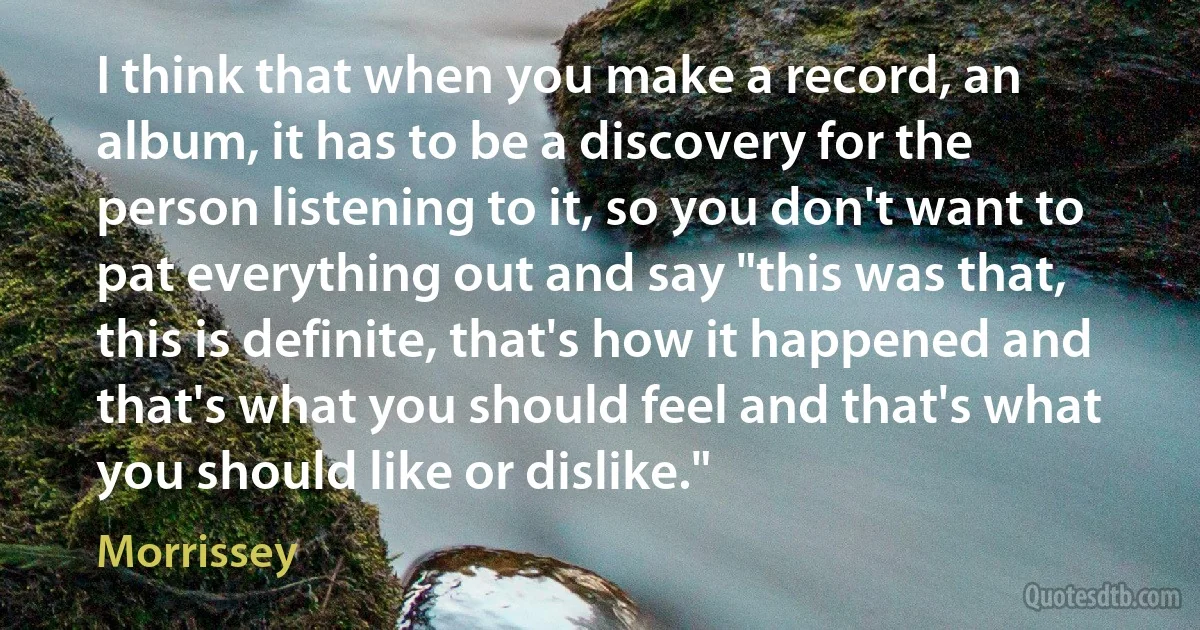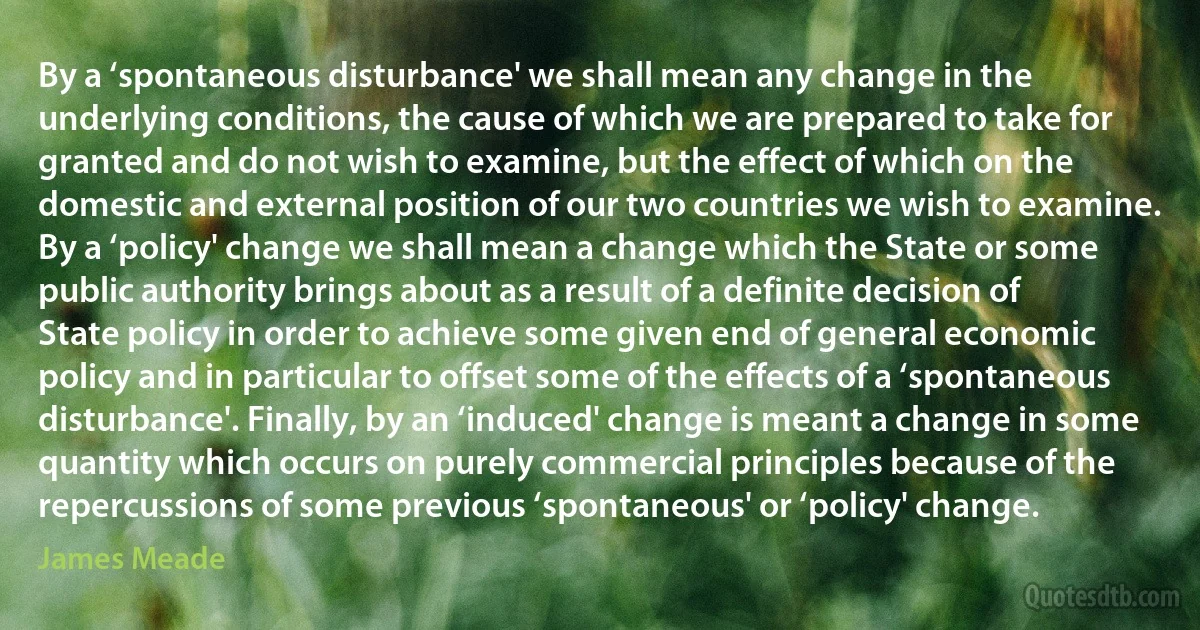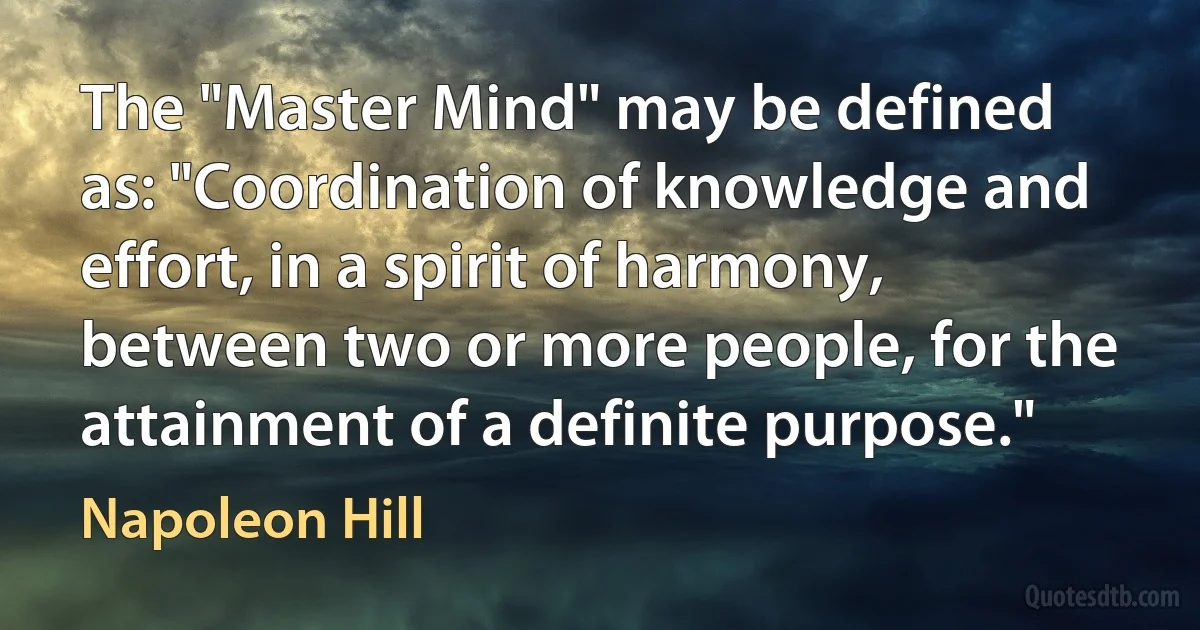Definite Quotes - page 6
That is why we give to children a proverb, or that which the Greeks call Chreia, to be learned by heart; that sort of thing can be comprehended by the young mind, which cannot as yet hold more. For a man, however, whose progress is definite, to chase after choice extracts and to prop his weakness by the best known and the briefest sayings and to depend upon his memory, is disgraceful; it is time for him to lean on himself. He should make such maxims and not memorize them. For it is disgraceful even for an old man, or one who has sighted old age, to have a note-book knowledge. "This is what Zeno said." But what have you yourself said? "This is the opinion of Cleanthes." But what is your own opinion? How long shall you march under another man's orders? Take command, and utter some word which posterity will remember. Put forth something from your own stock.

Seneca
With the publication of J. M. Keynes's General Theory in 1936 and the mathematical formalizations of his theory by J. R. Hicks (1937) and others, the language of macro-economic theory became systems of simultaneous equations. These are general equilibrium systems of interdependence in the sense that the relationships describe an entire national economy, not just a particular industry or sector. The systems are usually not completely closed; they depend on exogenous parameters including instruments controlled by policy-makers. Seeking definite relationships of economic outcomes to policies and other exogenous variables, qualitative and quantitative, these models sacrifice detail and generality, limiting the number of variables and equations by aggregations over agents, commodities, assets, and time.

James Tobin
Never mind what two tons refers to. What is it? How has it entered in so definite a way into our exprerience? Two tons is the reading of the pointer when the elephant was placed on a weighing machine. Let us pass on. ... And so we see that the poetry fades out of the problem, and by the time the serious application of exact science begins we are left only with pointer readings.

Arthur Eddington
Marx rejects as "absurd” the contention made by John Stuart Mill, and many of the political economists, that while production is governed by definite laws, distribution is controlled by (malleable) human institutions. Such a view underlies the assumption that classes are merely inequalities in the distribution of income, and therefore that class conflict can be alleviated or even eliminated altogether by the introduction of measures which minimize discrepancies between incomes.

Anthony Giddens
You see us poor Englishmen searching hard for the solution of a problem when there isn't one. You may think that the Irish want certain definite reforms, and that they will be happy and contented the day they get them; but not at all. What amuses them is discussion itself, plotting in theory. They play with the idea of Home Rule; if we gave it them, the game would be finished and they would invent another, probably a more dangerous one.

André Maurois
Must an artist live in the world or out of it? I believe this to be an unanswerable question. Total retirement, natural to the Saint, is injurious to most artists. They work marvelously so long as there are materials at hand. Goethe has further advice: "Solitude is a wonderful thing when one is at peace with oneself and when there is a definite task to be accomplished."

André Maurois
Cultures and religions do not exist apart from the individual minds that constitute them and the environments that constrain them, any more than biological species and varieties exist independently of the individual organisms that compose them and the environments that conform them. They are not well-bounded systems or definite clusters of beliefs, practices, and artifacts, but more or less regular distributions of causally connected thoughts, behaviors, material products, and environmental objects. To naturalistically understand what "cultures" are is to describe and explain the material causes responsible for reliable differences in these distributions.

Scott Atran
Love is like a wind stirring the grass beneath trees on a black night," he had said. "You must not try to be definite and sure about it and to live beneath the trees, where soft night winds blow, the long hot day of disappointment comes swiftly and the gritty dust from passing wagons gathers upon lips inflamed and made tender by kisses.

Sherwood Anderson
The hurricane that has swept us away is so strange & new a phenomenon that we shall not for some time understand its real meaning. ... It seems to me to be inspired by some definite desire for change: & means business. It may disappear as rapidly as it came: or it may be the beginning of a serious war of classes. Gladstone is doing all he can to give it the latter meaning.

Robert Gascoyne-Cecil, 3rd Marquess of Salisbury
If species had really arisen by the natural selection for impalpable differences, intermediate forms should abound, and the limits between species should be on the whole indefinite. As this conclusion follows necessarily from the premisses, the selectionists believe and declare that it represents the facts of nature. Difference between species being by axiom indefinite, the differences between varieties must be supposed to be still less definite. Consequently the conclusion that evolution must proceed by insensible transformation of masses of individuals has become an established dogma.

William Bateson
I am sure that a definite limit exists to the degree of equality which is desirable. We do not want complete equality of incomes, since extra responsibility and exceptional talent require and deserve a differential reward. We are not hostile, as our opponents sometimes foolishly suggest, to 'detached residences in Bournemouth where some elderly woman has obviously more than a thousand a year'. I do not myself want to see all private education disappear; nor the Prime Minister denied an official car, as in one Scandinavian country; nor the Queen riding a bicycle; nor the House of Lords instantly abolished; nor the manufacture of Rolls-Royces banned; nor the Brigade of Guards, nor Oxford and Cambridge, nor Boodle's nor (more doubtfully) the Royal Yacht Squadron, nor even, on a rather lower level, the Milroy Room, lose their present distinctive character; nor anything so dull and colourless as this.

Anthony Crosland
In many kinds of social interaction, unofficial communication provides a way in which one team can extend a definite but non-compromising invitation to the other, requesting that social distance and formality be increased or decreased, or that both teams shift the interaction to one involving the performance of a new set of roles.

Erving Goffman
For, for aught we know, or for aught that the new science can say to the contrary, the gods which play the part of fate to the atoms of our brains may be our own minds. Through these atoms our minds may perchance affect the motions of our bodies and so the state of the world around us. To-day science can no longer shut the door on this possibility; she has no longer any unanswerable arguments to bring against our innate conviction of free-will. On the other hand, she gives no hint as to what absence of determinism or causation may mean. If we, and nature in general, do not respond in a unique way to external stimuli, what determines the course of events? If anything at all, we are thrown back on determinism and causation; if nothing at all, how can anything ever occur? As I see it, we are unlikely to reach any definite conclusions on these questions until we have a better understanding of the true nature of time.

James Jeans



